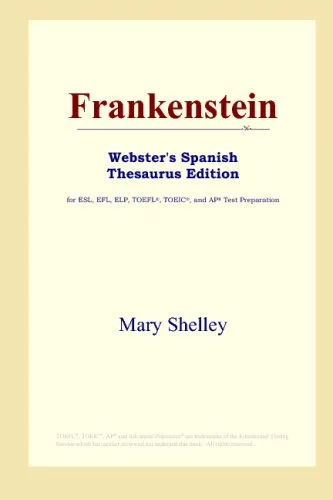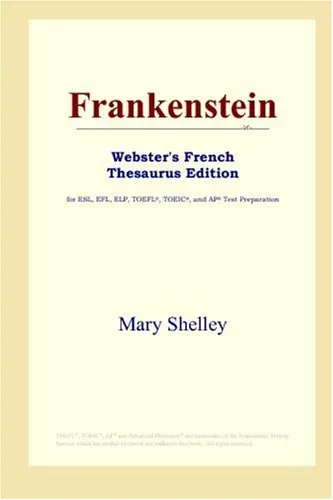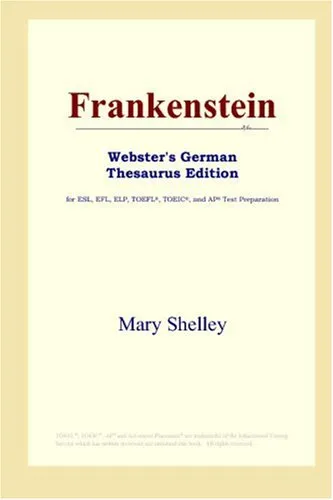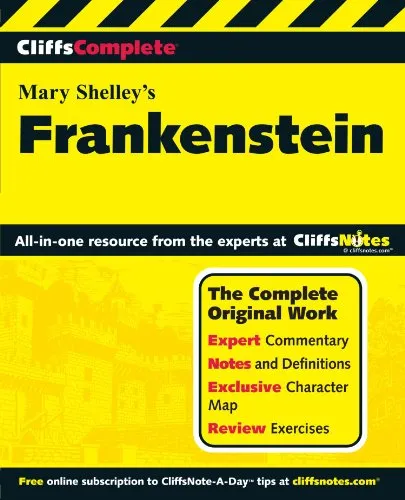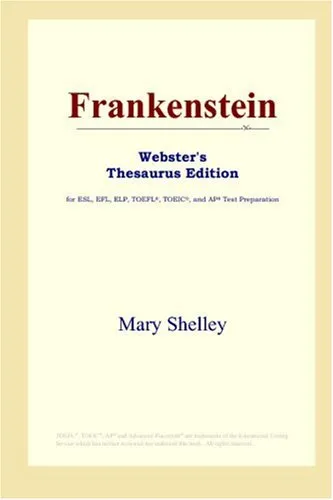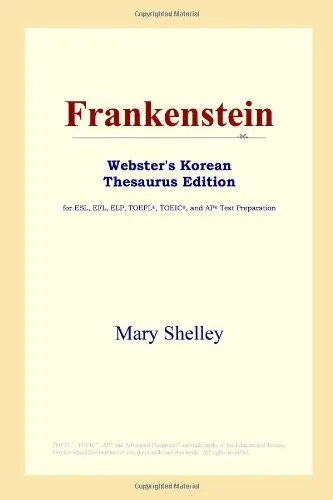Frankenstein (Webster's Spanish Thesaurus Edition)
4.0
بر اساس نظر کاربران

شما میتونید سوالاتتون در باره کتاب رو از هوش مصنوعیش بعد از ورود بپرسید
هر دانلود یا پرسش از هوش مصنوعی 2 امتیاز لازم دارد، برای بدست آوردن امتیاز رایگان، به صفحه ی راهنمای امتیازات سر بزنید و یک سری کار ارزشمند انجام بدینکتاب های مرتبط:
Persian Summary
خلاصهای جامع از کتاب 'Frankenstein (Webster's Spanish Thesaurus Edition)'
کتاب 'Frankenstein' اثر جاودانهی ماری شلی، داستان دانشمندی به نام ویکتور فرانکشتاین را روایت میکند که به دنبال کشف راز زندگی، موجودی را میسازد که در نهایت به کابوس بدل میشود. با استفاده از علم و تکنولوژی روزگار خود، او موفق به خلق موجودی میشود که در ابتدا تصور میکرد موفقیتی بزرگ است، اما از کنترل او خارج میشود و به تراژدی غیرقابل پیشبینی میانجامد.
در این نسخه از کتاب که شامل یک Webster's Spanish Thesaurus است، خوانندگان نه تنها با داستان کلاسیک فرانکشتاین آشنا میشوند، بلکه با استفاده از فرهنگ لغت اسپانیایی، معنای دقیقتر و عمیقتری از کلمات و اصطلاحات انگلیسی متن اصلی را درک میکنند.
نکات کلیدی
- کاوش در پیامدهای اخلاقی و علمی نوآوریهای علمی.
- پرسش درباره مرز بین دانش و اخلاق.
- تحلیل رابطه خالق و مخلوق و پیامدهای آن.
نقلقولهای معروف از کتاب
برخی از جملات و عبارات به یادماندنی این اثر عبارتند از:
"هیولا نه خود عامل بدیهای خود بود و نه در ابتدا نیت بدی داشت؛ بلکه این انسانها و برخوردها و ناملایمات بود که او را به راهی که رفت، کشاند."
"برای شناختن نیازهای زندگی، باید ابتدا مرگ را تجربه کرد."
چرا این کتاب مهم است
کتاب 'Frankenstein' نه تنها به عنوان یکی از اولین آثار در ژانر علمی-تخیلی شناخته میشود، بلکه به دلیل پرداختن به موضوعات جاودانی نظیر انسانیت، دانش، و اخلاق، در زمرهی آثار کلاسیک ادبیات جهان قرار دارد. این کتاب، به ویژه در زمینهای که در آن علم و تکنولوژی به سرعت پیشرفت میکنند، همچنان به عنوان یک هشدار برای بازبینی پیامدهای احتمالی اکتشافات علمی عمل میکند و خوانندگان را دعوت به تفکر درباره مسئولیتهای ناشی از این نوآوریها میکند.
این نسخه خاص، با گنجاندن Webster's Spanish Thesaurus، نه تنها به مخاطبان اسپانیاییزبان کمک میکند تا به درکی عمیقتر از متن اصلی برسند، بلکه بر اهمیت حفظ معنا و ترجمه فرهنگی صحیح تاکید دارد.
Introduction
Welcome to the enthralling world of "Frankenstein (Webster's Spanish Thesaurus Edition)"—a timeless piece of literature that merges Gothic horror with deep philosophical questions. This edition is particularly unique as it intertwines the classic English narrative with Spanish thesaurus annotations, providing an enriched experience for both language enthusiasts and literary scholars.
Detailed Summary
The story of "Frankenstein" is a haunting exploration of human ambition and the quest for knowledge, penned with an eloquence that has captivated readers for generations. The narrative is framed as a series of letters from explorer Captain Walton to his sister Margaret. During his expedition to the North Pole, Walton encounters Victor Frankenstein, a scientist driven to despair by his own creation.
Victor's tale begins with his idyllic upbringing in Geneva, Switzerland, where his boundless curiosity leads him to the study of natural philosophy. Obsessed with unlocking the secrets of life, Victor enrolls at the University of Ingolstadt and, after years of fervent study, discovers the secret to creating life. Victor constructs a creature from assembled body parts and endows it with life—a decision that leads to catastrophic consequences.
Initially, Victor is horrified by the creature's monstrous appearance and abandons it. The creature, left to discover the world alone, faces rejection and fear from all who encounter him. Yearning for companionship and understanding, he confronts Victor, demanding that a mate be created for him. Victor grapples with the moral implications of his actions and the potential threat a second creature might pose.
The novel illustrates the tragic plight of both creator and creation, as Victor's neglect and the creature’s vengeful path lead to a series of devastating events. Ultimately, Victor's obsessive pursuit of the creature results in a bleak confrontation in the Arctic wastes, where the narrative merges with Walton's expedition, bringing the tale full circle.
Key Takeaways
- The pursuit of knowledge and its ethical boundaries: "Frankenstein" poses critical questions about scientific responsibility and the moral dilemmas of innovation.
- The nature of humanity: The novel explores themes of isolation, the need for companionship, and what makes us truly human.
- Creator versus creation: The complex relationship between Victor and his creation offers insights into the responsibilities of a creator towards their work.
- The destructive potential of unchecked ambition: Victor's unbridled quest for glory leads to devastation, serving as a cautionary tale about the dangers of hubris.
Famous Quotes from the Book
"Beware; for I am fearless, and therefore powerful."
"I ought to be thy Adam, but I am rather the fallen angel..."
"Nothing is so painful to the human mind as a great and sudden change."
Why This Book Matters
"Frankenstein" holds a well-deserved place in literary canon not only for its riveting narrative but also for its exploration of profound themes that resonate in today's technologically advancing world. Mary Shelley's novel challenges readers to consider the ethical dimensions of scientific inquiry, making it a prescient work as relevant now as it was in 1818. This Webster's Spanish Thesaurus Edition provides additional linguistic context, fostering a deeper appreciation and understanding for a broader audience.
Conclusively, "Frankenstein" urges us to reflect on our own ambitions, ethical boundaries, and the responsibilities we hold towards our creations. In a world where science and technology are ever-evolving, the lessons enveloped within Shelley's narrative are enduring and vital.
دانلود رایگان مستقیم
شما میتونید سوالاتتون در باره کتاب رو از هوش مصنوعیش بعد از ورود بپرسید
دسترسی به کتابها از طریق پلتفرمهای قانونی و کتابخانههای عمومی نه تنها از حقوق نویسندگان و ناشران حمایت میکند، بلکه به پایداری فرهنگ کتابخوانی نیز کمک میرساند. پیش از دانلود، لحظهای به بررسی این گزینهها فکر کنید.
این کتاب رو در پلتفرم های دیگه ببینید
WorldCat به شما کمک میکنه تا کتاب ها رو در کتابخانه های سراسر دنیا پیدا کنید
امتیازها، نظرات تخصصی و صحبت ها درباره کتاب را در Goodreads ببینید
کتابهای کمیاب یا دست دوم را در AbeBooks پیدا کنید و بخرید
1401
بازدید4.0
امتیاز0
نظر98%
رضایتنظرات:
4.0
بر اساس 0 نظر کاربران
Questions & Answers
Ask questions about this book or help others by answering
No questions yet. Be the first to ask!
